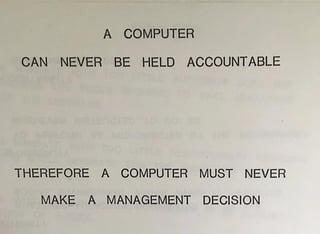
An AI is never accountable. Most generative AI at present cannot account for even where it got its knowledge from. A human may forget, and occationally cargo cult things, but the knowledge started somewhere.
While Plagiarism and link only answers are a problem as old as the network, a good chunk of our answers come from experience, either guided, or by experimentation. A human can hack at a problem till its correct, work through a process of reasoning, and even if they don't understand how an answer was derived, show you how they got there.
An AI does not know if its answers are correct. It combines a statistically plausible set of words that may or may not be correct. It does not have the capacity to think through an answer (yet?) or to test it.
It also doesn't have the capacity to think or synthesize. When its good for simple questions, often Q&A involves reasoning
I asked the 'free' version of chatgpt a version of this question.
I don't know if it could parse my network config and output, and a human would start asking me about these things. I'd note this is exactly what I started with as a problem, and the rest of the pair was from me hacking at it.
I'm currently speed/capacity testing one of the onboard I226-V and the bundled AQC113. Each has its own (currently dynamic, but stable) IP. If I turn on the system, or reboot without the I226-V plugged into the network - I am unable to connect to the AQC113. The AQC113 comes up immediately on the I226V being connected. I can't ping the system if the I226V is unplugged even on the AQC113's IP at any time.
Can you tell me how to fix this?
Give it a shot, or even try the full question. It just has no idea. Neither did I but I had the hardware in front of me, and was willing to try, and eventually tied some seemingly unrelated knowledge to it.
ChatGPT won't ask you 'what OS are you running' or 'can you share your network config" it'll give you an answer, but not necessarily one that's confirmed to be correct.
And that is the difference - a computer can't try things, have curiosity or get nerdbaited. ChatGPT and its equivalents are adequate for simple already existing answers (sometimes) but when they get complex or specialised, lack the breadth and depth.
I've even had people write software to solve a problem or troubleshoot an issue I had. ChatGPT does not judge you, but it does not care about the problem either. It'll give you something that feels good, but is essentially informational (or maybe unformational) junk food.
FWIW, it ended up being a poorly documented interaction between multigig cards, which ended up with me needing to set metrics manually for each interface. I have a theory but chatgpt wouldn't give me a good answer to why - I suspect its because 2 in 2.5 is a bigger number than the 1 in 10. But you can see the complete failure to try to solve the question. It gave me, well a practically useless checklist, without any real clear things to check.
Pretty much it didn't answer my question - which admittedly was very niche. It did not judge me, but this was hardly multifaceted or correct. It didn't do any real troubleshooting outside providing me a list of vague things to try. It ideated but did not have an idea. It also completely missed the very subtle point here - which needed some niche knowledge I remembers from a completely different OS

